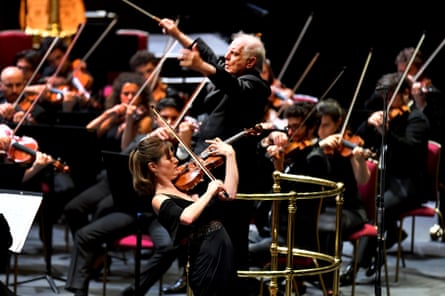The Hunting Gun, Austrian composer and pianist Thomas Larcher’s first opera, given its world premiere at Bregenz last week and heading for the Aldeburgh festival next year, addresses some of the most difficult questions in relationships between men and women: whether to stay or leave, speak out or stay silent, and what the composer describes as “the ultimate, profound loneliness inherent in every human being”.
That’s quite a task to accomplish in under two hours, but a clear, powerful text, some striking imagery and a luminous score of great beauty and originality ensure this opera’s success.
Larcher and his librettist Friederike Gösweiner have adapted Yasushi Inoue’s 1949 novella of the same name to create an intense, timeless drama about being trapped in yourself, being trapped in a relationship, and the rage, loneliness and guilt that lurks beneath our outer selves.
Hunter Josuke Misugi sends a poet three letters: from his niece, his wife and his mistress. The women appear and relate the content of those letters, ranging back and forth over time, their agonies and ecstasies laid bare. Shoko, his niece, has learned of his affair with her mother, Saiko, and rails against the duplicitous adult world. Saiko says she will take her own life because they have been discovered by Misugi’s wife, Midori, who in turn seeks a divorce, having actually known of the affair since it began.
To all this turmoil Larcher applies a score that reflects his belief that “tonal principles never really disappeared”, and that reinventing them for today is like wiring a historic house for electric light. And so in an ensemble that includes reeds, brass, accordion and percussion he inserts a Beethovenian string quartet and a Bachian choir, boosting the attractively textured sonority of the piece immensely.
Larcher has enjoyed a long collaboration with the British tenor Mark Padmore, and wrote the part of the Poet for him, but in the event, Padmore was unable to fulfil the engagement and Robin Tritschler took his place, an admirable substitute. Huge coloratura demands are made on soprano Sarah Aristidou as the enraged Shoko, and Giulia Peri, the wronged wife Midori. Mezzo Olivia Vermeulen as Saiko and baritone Andrè Schuen as Misugi sang with languid, sensuous ease. Michael Boder conducted Ensemble Modern and Schola Heidelberg with meticulous care, and Karl Markovics’s clean and unfussy direction complemented Katharina Wöppermann’s spare, Japanese-influenced design of paper and light. This promises to be a talking point at Aldeburgh next June.

In a departure from previous Proms, Daniel Barenboim chose not to speak to the audience when he brought his groundbreaking West-Eastern Divan Orchestra to the Albert Hall last week (Prom 43). Last year he gave a lengthy discourse on isolationism, which was widely interpreted as being about Brexit, though he later said it wasn’t. Had someone had a word? Whatever, this year, he buttoned his lip and let the music do the talking.
His orchestra, a living, breathing model of reconciliation and cooperation, opened with a wonderfully spirited reading of the Polonaise from Tchaikovsky’s Eugene Onegin – Israelis, Arabs, Turks, Iranians and Spaniards playing music by a Russian, conducted by an Argentinian-born, international citizen; perfect bridge-building.
There was more Tchaikovsky when the Georgian virtuoso Lisa Batiashvili joined them for the quicksilver violin concerto, her seamless phrasing and golden tone, particularly in the runaway finale, marking this out as the evening’s highlight.
The London premiere of Looking for Palestine by David Robert Coleman was a disappointment. Billed as a short operatic scene for soprano and orchestra, it sets text by Najla Said, daughter of the orchestra’s co-founder, Edward Said, telling of her crisis of identity as the offspring of a Lebanese mother and a Palestinian father living in New York. Small-voiced soprano Elsa Dreisig struggled to be heard over Coleman’s rich and imaginative orchestration, her poor diction not up to the task of enunciating unedited prose. She might have fared better with a structured libretto.

There’s nothing unstructured about West Side Story. Bernstein’s masterpiece is such an evergreen that it was a surprise to learn that John Wilson and his eponymous orchestra were giving the first ever complete performance at the Proms of the concert version of the 1957 hit, as part of the composer’s centenary celebrations (Prom 38).
Why had it taken so long? Perhaps because, stripped of Jerome Robbins’s choreography and most of the dialogue, a concert version is really only half the show. Still, with Wilson’s red-hot orchestra and some affecting performances from Mikaela Bennett as Maria and Ross Lekites as Tony this semi-staging, directed by Stephen Whitson, allowed us to concentrate on the true glory of the piece – Bernstein’s fabulously infectious and inventive score, even if quite a few of Sondheim’s cleverest lyrics were sacrificed to the bathroom acoustic of the Albert Hall.

Comments (…)
Sign in or create your Guardian account to join the discussion